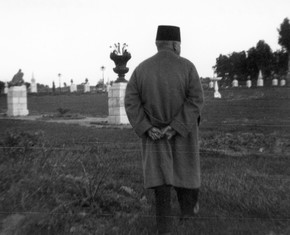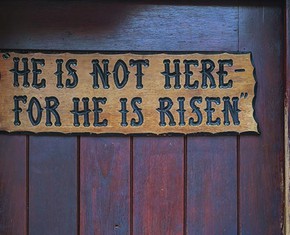The views expressed in our content reflect individual perspectives and do not represent the authoritative views of the Baha'i Faith.
The Bab—the Forerunner of Baha’u’llah and co-Founder of the Baha’i Faith—offers a deeply-spiritualized vision of reality.
He perceives all of existence as being a creation of the Primal Will of God, which emanates, like rays of the sun, from God’s own Self. Like the sun in our physical heaven, the interior Essence of God is too exalted to be approached by any of His creatures. His Essence is utterly transcendent. He is truly known only to Himself:
…‘No vision taketh in Him but He taketh in all vision. He is the Subtle, the All-Perceiving.’ Glory be unto Thee, O my God, indeed no mind or vision, however keen or discriminating, can ever grasp the nature of the most insignificant of Thy signs. Verily Thou art God, no God is there besides Thee. – The Bab, Selections from the Writings of the Bab, p. 203.
Like the rays shining out in every direction from the star at the center of our solar system, God’s Primal Will, the Logos, the Holy Spirit of God—all of His loving, wise and powerful attributes—is generating all things and is radiating throughout all realms of existence. All of creation is vitalized by Its effects. Therefore, all things shine with the Light of His divine revelation. This is one of the Bab’s core teachings.
Dr. Nader Saiedi, in his book Gate of the Heart, describes this outlook as “the perspective of unity,” which sees:
… in all things only the signs and traces of the divine Effulgence that permeates and constitutes all creation.
…the perspective of unity … transforms all of reality into mirrors reflecting the divine names, in every possible form, in all their glory. – pp. 339; 267.
This perspective presents a spiritualized vision of reality because of the Bab’s teaching that all things are reflections of the attributes of God, which He, as Creator, has deposited within every atom and particle of the universe, and within every living creature, including all people.
In their infinitely diverse forms, all things reflect the same Light of God because, as the Bab and Baha’u’llah both taught, there is only one God. Naturally, then, all the Light (of the Primal Will) originates from the same Source. The Creator doesn’t descend into the mirrors; from His exalted heights He shines His light upon them. All things are united as recipients of His light.
Indeed, the Bab wasn’t saying that God is “in” all things. Think of the difference between these three statements: “All things are God”, “God is ‘in’ all things” and “All things are of God.” The first statement tries to equate God with His creation, a concept called pantheism, which would be abhorrent to the Bab. The second statement is just like it, by somehow putting God “inside” all created things, like the beating heart is physically inside the body. This view would also be considered outrageous by the Bab. Only the third statement is agreeable to the Bab. For Him, God alone is the Source and that in some manner all things are reflections of that same Source. The painter and the painting are not the same. The book and the writer of the book are not the same. And yet, isn’t it wonderful that the painting magnificently reflects the artistry, skill, personality and vision of the painter? When we read a book, don’t we somehow find an expression of the author’s mind within the pages?
According to the Báb, God expresses His grace when He, in a never-ending progression, periodically sends into human history Divine Educators, who embody and transmit the Primal Will of God.
In the time of the First Manifestation the Primal Will appeared in Adam; in the day of Noah It became known in Noah; in the day of Abraham in Him; and so in the day of Moses; the day of Jesus; the day of Muhammad, the Apostle of God; the day of the ‘Point of the Bayan’ [the Báb]; the day of Him Whom God shall make manifest [Bahá’u’lláh]; and the day of the One Who will appear after Him Whom God shall make manifest. Hence the inner meaning of the words uttered by the Apostle of God, ‘I am all the Prophets’, inasmuch as what shineth resplendent in each one of Them hath been and will ever remain the one and the same sun. – The Bab, Selections from the Writings of the Bab, p. 126.
Later on, someone asked Baha’u’llah which of the Divine Educators are superior to the others. Responding from the perspective of unity, he said:
Know thou assuredly that the essence of all the Prophets of God is one and the same. Their unity is absolute … To prefer one in honor to another, to exalt certain ones above the rest, is in no wise to be permitted. – Baha’u’llah, Gleanings from the Writings of Baha’u’llah, p. 78.
So, the Bab’s perspective of unity is based on the recognition of God’s transcendent oneness, on the radiating power of His Primal Will which is reflected in all things, on His gracious activity as the Sender of the Prophets, and finally upon the spiritual oneness of each and every person born on the planet. Human beings, especially, are “mirrors” capable of consciously reflecting God’s Primal Will, such as His many attributes of grace, love, kindness, wisdom, power, forgiveness, mercy and justice, to mention a few. The Báb writes:
Become as true brethren in the one and indivisible religion of God, free from distinction, for verily God desireth that your hearts should become mirrors unto your brethren in the Faith, so that ye find yourselves reflected in them, and they in you. This is the true Path of God … – The Bab, Selections from the Writings of the Bab, p. 56.
The Bab applied this perspective of unity to an everyday situation in one intriguing passage, writing about two individuals disputing with one another about religion. Neither has discovered the whole truth of God; each has managed to understand just a tiny glimpse of the truth:
Thus these two would dispute: This one sayeth, “Thou art an extremist,” and the other one sayeth, “Thou art intolerant,” This one adduceth evidence from a word of God, and that one reasoneth by another word of God. But I affirm unto them: Ye both are true and right, on the condition that thou not say unto him, “He is an extremist,” and he not say unto thee, “Thou art intolerant.” … Thus, wert thou to acquire wisdom, thou wouldst not reject anyone because of his limitation, but must foster the growth of all in the palm of thy mercy. Shouldst thou succeed in elevating him to the realm of glory, great would be his blessings from thee; and should he fail to ascend to thy height thou shouldst train him within his own rank of existence. For verily he too is a creation of thy Lord; God loveth him and he loveth God …. – The Bab, The Panj Sha’n, cited by Nader Saiedi in Gate of the Heart, pp. 175-177.
Edward Price is the co-writer and producer of the new documentary film The Gate: Dawn of the Baha’i Faith. Schedule a screening for your community.
















Comments
Sign in or create an account
Continue with Googleor